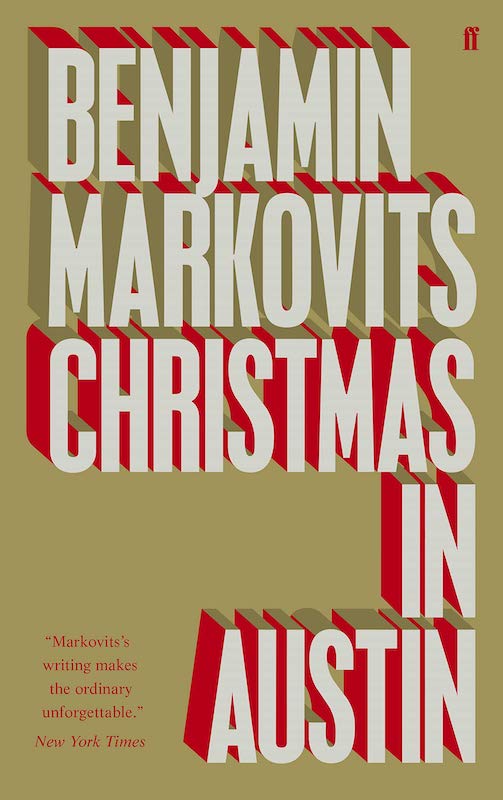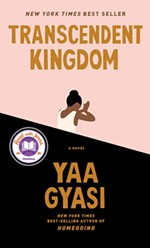Interview With Benjamin Markovits
The Christmas in Austin author talks about his former home
By Robert Faires, 4:45PM, Tue. Dec. 17, 2019
When an author living in London writes a book set in Austin, a reader has reason to question his feel for the local scene. But when that book has its characters chomping down on Ruby's BBQ, tramping up Mount Bonnell, and even shooting to Bergstrom via Manor Road and Airport so as to bypass I-35, the question becomes: How in Bevo's name does a Brit know all that?
Well, in the case of Benjamin Markovits, the respected author of You Don't Have to Live Like This and other novels, he lived here. And not just for a little while. He grew up here. And his parents still make their home here, so he's returned for many family visits – a situation that serves as the basis for the just-published Christmas in Austin. It centers on the members of Essinger clan, whose story Markovits first explored in his 2018 novel A Weekend in New York. The author was kind enough to let someone from one of his hometown papers probe his personal history and how it fed into his current book.
Austin Chronicle: So what unfinished business did you have with the Essingers that led you to revisit them in another novel? And was it important to you that the novel take place in Austin?
Benjamin Markovits: The plan from the beginning was actually to write four novels, framed partly by the slow breakdown in the relationship between two of the main characters, Paul, a tennis player on the edge of retirement, and Dana, the mother of his son. I always knew I wanted to take them to Austin. Paul feels that in some way his life and character have gone downhill since childhood, so he wants to go back home … But part of what makes Austin interesting to me is that it has also changed a lot since I was a kid, it's become busier and more cosmopolitan, so that the city Paul returns to isn't quite the one he grew up in.
AC: What years did you live here, and what memories of that time do you associate with the city?

BM: I was born in California, where my dad taught, but we moved to Austin when I was two because my parents both got jobs at the university. That was in 1975. My mother is German and they took sabbaticals abroad, but we always came back to Austin – which is where I lived more or less until graduating from McCallum High School in 1992. I once wrote a piece about Austin for an English magazine in which I compared it to the island of the lotus eaters – it seemed to me a place where it was too easy for me to be happy. Because of the weather and the hoop in our backyard, and the food, and Half Price Books around the corner from our house (it's moved now). Partly I was just talking about childhood. Austin just seemed to me like a really nice campus town when I was a kid.
AC: Were there specific places or experiences you knew you wanted to include in the novel, either because they represented the older Austin you knew or the newer Austin that you may not?
BM: Yes. I write about the 37th Street Christmas lights, for example, which is a five-block walk from our house, and Texas French Bread and Wheatsville Co-op, all places we go to when I'm home, and where we also went as kids. (The Spider House features [in the novel], too, but it opened after I left for college.) Austin is changing fast enough that sometimes new Austin seems to become old Austin in front of my eyes. Changos closed this year, and Ruby's BBQ, whose smoker we could smell from our back yard, and which catered my wedding in London, also shut. It feels like the city of slackers has become a city of strivers, and that's part of what Paul is reacting against, one of the things he dislikes about adult life: all this pointless striving.
But I also wanted to complicate this picture. Some of the book is written from the point of view of Liesel, Paul's German mother, who looks back on her arrival in Texas as a young mother and an academic starting out in her career … and recalls the strangeness and distance from her own childhood that she felt. Austin symbolized for her a first experience with the American South. And she remembers the work she had to put in (all the striving) to make a life for herself there.
AC: In that vein, is there a character to the city that you wanted in the novel – maybe a quality or qualities that played off the Essingers and where they are in their lives?
BM: I've answered some of this above, but one of the main characters in the book is the Essingers' house: a 1920s colonial in the Hemphill Park neighborhood, just off Guadalupe. Like most family homes, it has become a kind of museum, specializing in the period of their lives when the kids were kids (Hardy Boys books on the shelves, art projects on the walls, soccer and math trophies in the spare room, etc.). So when they go back home, it's like going to a museum. And Liesel worries about what will happen to the house after she dies – what her children will do with it. To give it up is to give up the part of your life that seems most meaningful, but to live there again (she thinks Paul might consider it) is to live in a museum, which is never a good idea.
A note to readers: Bold and uncensored, The Austin Chronicle has been Austin’s independent news source for over 40 years, expressing the community’s political and environmental concerns and supporting its active cultural scene. Now more than ever, we need your support to continue supplying Austin with independent, free press. If real news is important to you, please consider making a donation of $5, $10 or whatever you can afford, to help keep our journalism on stands.
Evan Rodriguez, Nov. 12, 2020
Barbara Purcell, Nov. 11, 2020
Sept. 24, 2021
Sept. 17, 2021
fiction, books set in Austin, Benjamin Markovits, Hemphill Park, McCallum High School, Ruby's BBQ, Texas French Bread, Wheatsville Co-op










